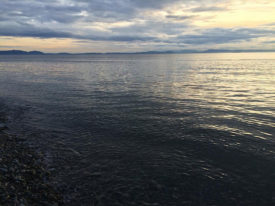Northwest Environment Watch, a Seattle-based research and communications center, announced today that it has changed its name to Sightline Institute. The 13-year-old think tank, which tracks the Pacific Northwest’s progress toward a sustainable way of life and identifies regional solutions, has also launched a comprehensive online resource center on key sustainability issues such as sprawl, energy use, pollution, and human health at http://www.sightline.org.
Alan Durning, executive director of Sightline, said: “We’ve changed our name to Sightline because it more strongly reflects our reason for being: to help engaged citizens see a clear way to the kind of future we all want—a healthy, lasting prosperity for the Northwest.”
Read more about the name change here.
Since 1993, Sightline’s research and publications–including the Cascadia Scorecard, an annual progress report for the region, and numerous books, reports, articles, and maps–have been used extensively by Cascadia’s elected officials, media, leaders, and active citizens. Key policy changes in the region influenced by Sightline’s research include a pilot tax shift in British Columbia in 2001; phase-outs of toxic flame retardants in Oregon and Washington in 2004 and 2005; and Seattle’s new strategy to make its center city vibrant and walkable like Vancouver, BC.
Thedailyscore.net makes available much more of the organization’s work, in versions easy for users to download, use, and share with others. Key features of the site include:
- The Sightline Daily weblog (formerly the Cascadia Scorecard Weblog), featuring short daily articles and commentary on the most important news and trends affecting the Northwest.
http://www.sightline.org - A maps and graphics center with more than 100 downloadable maps, charts, and animations illustrating trends such as gasoline consumption; ozone pollution; and sprawl in seven Northwest cities. http://www.sightline.org/publication_type/maps-graphics
- Regional data and maps on British Columbia, Idaho, Oregon, and Washington:
http://www.sightline.org/research - Comprehensive sections on each issue that Sightline tracks, including climate and energy, economy and jobs, environment, food, sustainable living, land use, and transportation.
http://www.sightline.org/research - Press center with expert sources, story ideas and Sightline’s latest press releases.
http://www.sightline.org/press - Full text of Sightline books and reports, including Cascadia Scorecard 2005, as well as related fact sheets, maps, and charts. http://www.sightline.org/publication_type/books
“Sightline.org is packed with research and tools for improving our region’s quality of life and the natural heritage that northwesterners value so deeply,” said Durning.
Sightline Institute’s annual report on the region’s performance—Cascadia Scorecard 2006—will be published in June of 2006. This year’s Scorecard will focus on how the region’s choices about urban design, land use, and transportation affect northwesterners’ health. Sign up for updates on Scorecard research at http://www.sightline.org/signup.






